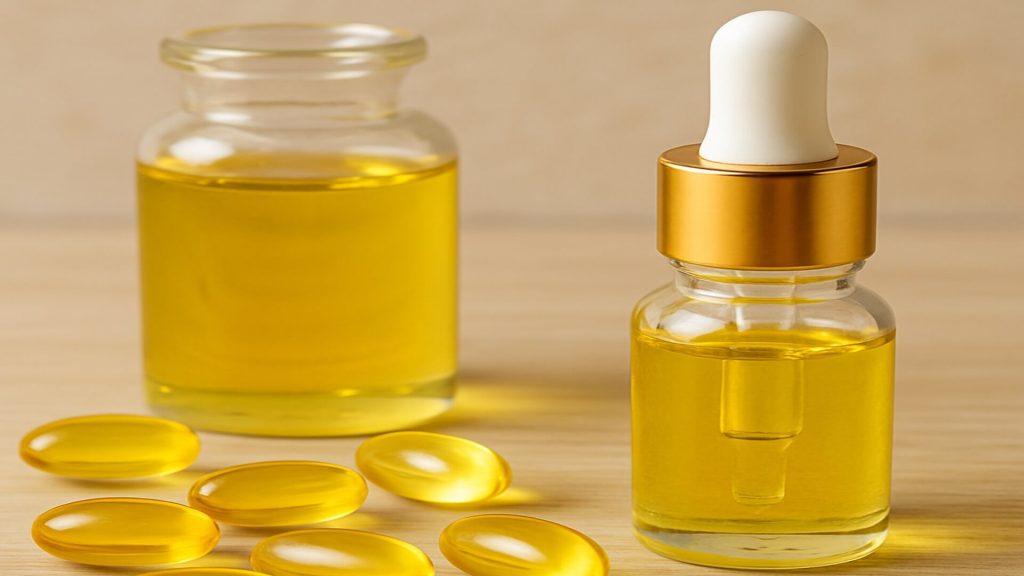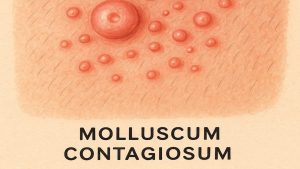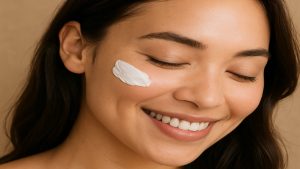- Vitamin E protects skin from oxidative damage
- Supports barrier strength and moisture balance
- Topical benefits for eczema remain limited
- Combines effectively with vitamin C for radiance
Vitamin E plays an important role in maintaining healthy, hydrated, and resilient skin. Recognised for its antioxidant and moisturising properties, it helps defend skin cells from environmental stress such as pollution and UV exposure.
This article explains how vitamin E works, its potential skincare benefits, and practical considerations for safe use as part of a balanced skincare routine.

The Science Behind Vitamin E
Vitamin E refers to a group of eight naturally occurring compounds known as tocopherols and tocotrienols. Alpha-tocopherol is the most biologically active form and the one most often used in skincare formulations [2].
Vitamin E is fat-soluble and accumulates in the outer layer of the skin, where it supports the natural barrier and reduces moisture loss. It also helps neutralise free radicals generated by sunlight and pollution, reducing oxidative stress that contributes to early skin ageing [1, 2].
Is Vitamin E Good For Skin?
Vitamin E offers antioxidant protection and may help reduce dryness while supporting overall skin comfort [2]. Research indicates that people with chronic inflammatory skin conditions such as atopic dermatitis or psoriasis often show lower serum vitamin E levels, suggesting a link between the nutrient and skin health [3].
However, evidence for vitamin E creams or oils as a treatment for eczema or other inflammatory skin diseases remains limited. Topical use should therefore focus on barrier support and hydration rather than disease management [3].
Applications Of Vitamin E In Skincare
Vitamin E appears in many topical products, each with different textures and benefits.
| Application | Description | Typical Benefit |
|---|---|---|
| Vitamin E Oil | Concentrated form for direct use | Helps relieve dryness and support barrier repair |
| Vitamin E Serum | Lightweight formula | May improve radiance and firmness |
| Vitamin E Cream | Moisturising base for daily use | Helps reduce dryness and support elasticity |
Table 1: Common topical forms of vitamin E
Vitamin E In Natural Skincare
Vitamin E is widely included in natural and plant-based skincare because it mixes well with oils such as jojoba and shea butter. These blends enhance hydration and softness while remaining gentle on sensitive skin.
A balanced diet rich in nutrients including vitamin E also contributes to overall skin health and resilience [1].
Vitamin E For Skin Repair & Radiance
Vitamin E may help stabilise collagen and protect against free-radical damage that contributes to fine lines and uneven tone. Evidence for scar reduction is inconsistent, though vitamin C shows stronger data for supporting collagen formation [5, 6].
When combined with vitamin C, vitamin E provides complementary antioxidant activity, which can improve luminosity and help protect from UV-induced oxidative stress [4].
| Aspect | Possible Role Of Vitamin E |
|---|---|
| Moisture Retention | Strengthens barrier to reduce water loss [2] |
| Inflammation Support | May assist mild eczema symptoms [3] |
| UV Protection | Helps limit oxidative damage [2] |
| Wound Healing | Linked with tissue repair; evidence limited [6] |
Table 2: Summary of vitamin E skin functions
Combining Vitamin E With Other Ingredients
Vitamin E performs well when paired with hydrating and soothing ingredients such as:
- Jojoba oil or shea butter for deep moisturisation.
- Aloe vera for calming post-sun care.
- Vitamin C for enhanced antioxidant protection [4].
Such combinations support both natural and prescription skincare routines focused on gentle barrier repair.
Monderma’s Personalised Approach
Monderma provides prescription skincare for acne, ageing, pigmentation, and rosacea. Each formulation is reviewed by healthcare professionals to ensure suitability.
The base cream used in Monderma prescriptions includes vitamin E (as tocopheryl acetate) along with jojoba oil and shea butter, helping maintain hydration while supporting the action of other active ingredients.
Considerations When Using Vitamin E
Possible Reactions
A small number of users experience irritation or redness when applying vitamin E. Conduct a patch test before full use and discontinue if sensitivity occurs [2].
Effective Strengths
Formulations typically contain 0.5 to 1 percent vitamin E, offering measurable antioxidant support without increasing the risk of irritation [2]. Professional guidance helps determine suitable concentrations for each skin type.
Conclusion
Vitamin E provides proven antioxidant and moisturising benefits that help maintain healthy, hydrated, and radiant skin. Although evidence for certain therapeutic uses remains limited, it remains a valuable supportive ingredient in daily skincare.
For tailored prescription skincare containing vitamin E and complementary actives, complete your free consultation for a professional review.
Content is for informational purposes only. Monderma treatments are prescribed following consultation. Results and timeframes can vary. Use as directed by your prescriber.
Bibliography
- NHS. Vitamins and Minerals – Vitamin E. 2020.
- Nachbar F, Korting HC. The Role of Vitamin E in Normal and Damaged Skin. J Mol Med (Berl). 1995; 73(1): 7–17.
- Liu X et al. Serum Vitamin E Levels and Chronic Inflammatory Skin Diseases. PLoS ONE. 2021; 16(12): e0261259.
- Pullar JM et al. The Roles of Vitamin C in Skin Health. Nutrients. 2017; 9(8): 866.
- Wang Z et al. Vitamin E Regulates Collagen via Antioxidant Effects and the TGF-β/Smads Pathway. Antioxidants (Basel). 2024; 13(7): 847.
- NHS Wales. Scars. 2024.
Find your perfect skincare formula
Takes less than 2 minutes – see what your skin needs
Get Custom Formula













